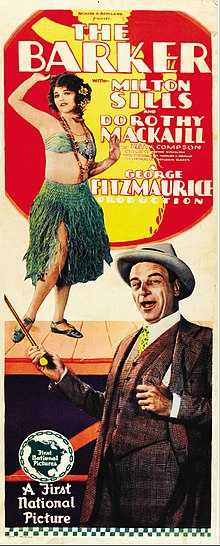The Barker
| The Barker | |
|---|---|
 Theatrical release poster | |
| Directed by | George Fitzmaurice |
| Written by | Benjamin Glazer Joseph Jackson Herman J. Mankiewicz (titles) |
| Based on | The Barker by Kenyon Nicholson |
| Produced by | Al Rockett Richard A. Rowland |
| Starring | Milton Sills Dorothy Mackaill Betty Compson Douglas Fairbanks Jr. |
| Cinematography | Lee Garmes |
| Edited by | Stuart Heisler |
| Music by | Louis Silvers |
Production company | |
| Distributed by | Warner Bros. Pictures |
Release date | December 9, 1928 |
Running time | 87 minutes |
| Country | United States |
| Languages | English (Intertitles and talking scenes) |
The Barker is a 1928 American part-talkie pre-Code romantic drama film produced and released by First National Pictures, a subsidiary of Warner Bros., acquired in September 1928. The film was directed by George Fitzmaurice and stars Milton Sills, Dorothy Mackaill, Betty Compson, and Douglas Fairbanks Jr. The Barker is a part-talkie with talking sequences and sequences with synchronized musical scoring and sound effects. The film was adapted by Benjamin Glazer, Joseph Jackson and Herman J. Mankiewicz from the play by Kenyon Nicholson.[1][2]
The Broadway play of the same name which opened at the Biltmore Theatre January 18, 1927 and ran until July 1927 for 221 performances. In the stage production Walter Huston was "Nifty" and a still relatively unknown Claudette Colbert was "Lou", played in the film by Dorothy Mackaill.[3]
Plot
The film tells the story of a woman, Lou (Dorothy Mackaill), who comes between a man, Nifty Miller (Milton Sills), and his estranged son Chris (Douglas Fairbanks Jr.). Nifty is a carnival barker who is in love with a dancing girl and is ambitious to have his son, Chris, become a lawyer. Chris has other ideas and during his vacation he hops a freight, joins the carnival, and weds a dancing girl (Mackaill). Eventually, Chris fulfills the ambition his father had for him.
Cast
- Dorothy Mackaill as Lou
- Milton Sills as Nifty Miller, the barker
- Douglas Fairbanks Jr. as Chris Miller
- Betty Compson as Carrie
- Sylvia Ashton as Ma Benson
- George Cooper as Hap Spissel
- S. S. Simon as Col. Gowdy
- Tom Dugan as Stuttering Spieler
Uncredited:
- Bobby Dunn as Hamburger concessionaire
- Pat Harmon as Heckler
- Bynunsky Hyman as Fire Eater
- Gladden James as Member of Hawaiian Trio
- Charles Sullivan as Man in audience
- Pat West as Bartender
Awards and honors
| Year | Award | Result | Category | Recipient |
|---|---|---|---|---|
| 1928 | Academy Award | Nominated | Best Actress in a Leading Role | Betty Compson |
Preservation
The film survives intact with its talking sequences and has been preserved by the UCLA Film and Television Archive and the Museum of Modern Art.[4] [5]
Remakes
The Barker was remade as Hoop-La (1933) with Clara Bow and as Diamond Horseshoe (1945) with Betty Grable. Japanese director Yasujirō Ozu remade this film (without crediting the original) as A Story of Floating Weeds (1934) and again as Floating Weeds (1959).[citation needed]
See also
References
- ^ The Barker at silentera.com
- ^ The American Film Institute Catalog Feature Films: 1921-30 by The American Film Institute, (1971)
- ^ The Barker on Broadway at the Biltmore Hotel, Jan. 18 1927 to July 1927; IBDb.com
- ^ Library of Congress/ FIAF American Silent Feature Film Survival Database: The Barker
- ^ The Barker at UCLA Film and Television Archive
External links
- The Barker at AllMovie
- The Barker at IMDb
- Still at UCLA Film and Television Archive
- Still at silentfilmstillarchive.com
